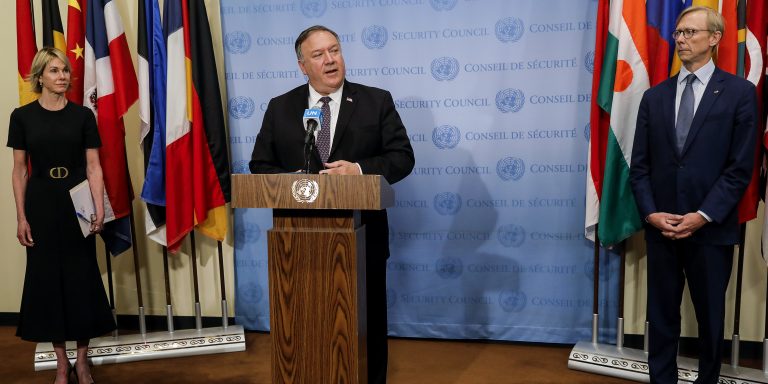INTELBRIEF
August 24, 2020
IntelBrief: U.S. Struggles to End Iran Nuclear Deal

Bottom Line Up Front
- The Trump administration is likely to fail in its efforts to end the 2015 multilateral Iran nuclear agreement by re-imposing all United Nations sanctions.
- A U.S. declaration that U.N. sanctions are back in force will not attract significant international cooperation.
- Iran is likely to remain in the nuclear deal on the expectation that the U.S. move will fail or be reversed after the U.S. election.
- The United States has little leverage to compel Russia and China to refrain from proceeding with new arms sales to Iran.
On August 20, Secretary of State Mike Pompeo delivered to the current U.N. Security Council president, Indonesia, a formal complaint that Iran is in material breach of its obligations under the 2015 multilateral nuclear agreement (Joint Comprehensive Plan of Action, JCPOA). Under the JCPOA and U.N. Security Council Resolution 2231, a material breach complaint by a JCPOA ‘participant’ (defined in the Resolution as Iran, the United States, the United Kingdom, France, Germany, Russia, and China) can trigger the re-imposition of all United Nations sanctions that were in effect prior to the JCPOA. The sanctions are to go back into effect within 30 days unless the Council passes a resolution continuing the sanctions relief – a resolution the United States can veto. To justify the U.S. action, Pompeo presented the Council president a State Department legal brief arguing that the U.S. ‘participant’ status in the accord did not legally end when the Trump administration withdrew from the JCPOA in May 2018. The U.S. action came days after the Security Council overwhelmingly voted down a U.S. draft resolution to indefinitely extend the U.N. ban on arms transfers to or from Iran. The ban remained in place after the JCPOA was signed but was set by Resolution 2231 to expire on October 18, 2020, and the Trump administration has been threatening to invoke the broad sanctions snapback if the Security Council refused to extend that embargo.
The international reaction to the U.S. snapback trigger was universally negative. The three European parties to the JCPOA, and the EU foreign policy chief Josep Borrell separately, issued statements directly refuting the U.S. assertion of standing to trigger the sanctions snapback. According to the British, German, and French joint statement: ‘…the US ceased to be a participant to the JCPOA following their withdrawal on 8 May, 2018. Our position regarding the effectiveness of the US notification pursuant to Resolution 2231 has consistently been very clearly expressed to the Presidency and all UNSC members. We cannot therefore support this action which is incompatible with our current efforts to support the JCPOA.’ That reaction, similar to those issued by Russia and China, indicates that a U.S. declaration that U.N. sanctions are back into effect will be challenged and not implemented by virtually any government.
A major question is whether Iran reacts by withdrawing entirely from the JCPOA. Some suggest that the Trump administration is attempting to trigger the sanctions snapback with the expectation that Iran will withdraw from the accord and that the JCPOA will dissolve entirely – making it difficult to resurrect even if former Vice President Joe Biden is elected president in the November 2020 U.S. presidential election. However, Iran’s immediate reaction has been muted. Iran’s leaders undoubtedly calculate that they are benefitting from U.S. isolation on this issue, that additional sanctionswill not actually be imposed, and that the United States might return to the JCPOA after the U.S. presidential election, depending on the election outcome. Iran has long claimed that its nuclear violations since 2019 are ‘reversible’ if sanctions pressure on Iran ends.
The longer term question is how the Trump administration, particularly if it receives a second term, will react to broad international rejection of its assertion that U.N. sanctions are back in effect. The United States has historically been reluctant to sanction U.S. allies in Europe. And, although the European countries have clearly indicated that they will not recognize the U.S. snapback action, the European countries will likely still abide by a longstanding European Union policy not to sell arms or militarily useful technology to Iran. Conversely, Russia and China are not U.S. allies and are eager to sell arms to Iran, but they also are major powers over which the United States has little leverage. Both countries are likely to proceed with planned new sales of combat aircraft, tanks, and naval vessels to Iran unless, perhaps, the Trump administration is willing to offer significant U.S. concessions on other bilateral issues.